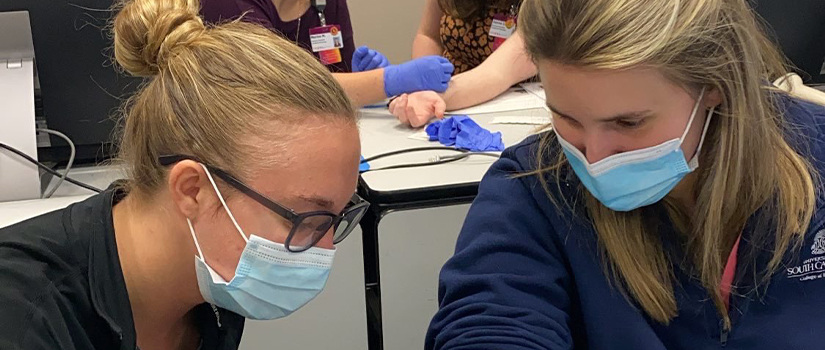Home Study / Enduring Material
The 11-hours of home-study materials will be delivered via interactive recordings guided by expert contributors. To access the home-study material, you must also sign up for a live delivery.
Author: Justin Chen, MD
Reviewer: Eric Macy, MD
Learning Objectives
- Distinguish drug allergy from other adverse drug reactions
- Describe the immunologic basis of drug and penicillin allergies
- Review penicillin sensitization risk following treatment and over time
- Assess cross-reactivity between penicillin and related β-lactams
Author: Christopher M. Bland, PharmD
Reviewer: Julie Ann Justo, PharmD, MS
Learning Objectives
- Define beta-lactams for purposes relevant to penicillin allergy and treatment choices
- Identify infectious diseases where beta-lactams are preferred therapies for management
- Summarize key studies demonstrating clear evidence for beta-lactam superiority in common infectious diseases
- Evaluate specific pathogens for which beta-lactams are preferred therapy
- Outline areas where beta-lactams are preferred for antimicrobial prophylaxis
- Differentiate between penicillins and cephalosporins for treatment of specific infectious
diseases and/or pathogens
Author: Mary Staicu, PharmD
Reviewer: Michael Tiberg, PharmD
Learning Objectives
- Compare infectious outcomes in penicillin-allergic versus non-penicillin-allergic patients
- Identify consequences associated with the use of non-β-lactam antibiotics in penicillin-allergic patients
- Appraise the financial implications associated with the penicillin allergy label
Author: Emily Heil, PharmD
Reviewer: Nathon Parker, PharmD
Learning Objectives
- Apply knowledge of study designs and statistical methods to the appraisal of a clinical study on risk of surgical site infection in patients with and without reported penicillin allergy
- Identify the strengths and limitations of a retrospective cohort study design in assessing the association between penicillin allergies and surgical site infections
- Evaluate the clinical applicability of reported penicillin allergy in the selection
of antibiotic surgical prophylaxis
Reviewer: Mildred Kwan, MD; Brandon Dionne, PharmD
Learning Objectives
- Value the importance of appropriate drug allergy assessment
- Recognize pertinent questions to ask to complete an effective penicillin allergy assessment
Reviewer: Megan Jeffres, PharmD
Learning Objectives
- Recognize the indications for penicillin allergy interventions
- Compare and contrast the procedural aspects and performance parameters of graded challenges and penicillin desensitization as alternatives to penicillin skin testing
- Recommend an appropriate management strategy for a patient with a reported penicillin
allergy
Reviewer: Sheenal Patel, MD
Learning Objectives
- Define the utility and limitations of PAST, including contraindications to PAST
- Identify the PAST kit contents and recall their preparation and storage requirements
- Describe the process of conducting a PAST, including anticipatory guidance to patients about what to expect from testing
- Interpret the results of a PAST
Reviewer: Shyam Joshi, MD; Krutika Mediwala, PharmD
Learning Objectives
- Outline state and federal regulations for penicillin skin testing programs
- Define the key elements of a protocol detailing the steps to complete penicillin skin testing
- Analyze current literature on implementation of penicillin skin testing
- Compare and contrast different types of penicillin skin testing programs
- Explore initial steps for an individual facility to implement a penicillin skin testing
program based on available resources
Reviewer: Caitlin Mardis, PharmD
Learning Objectives
- Apply knowledge of study designs and statistical methods to the appraisal of the clinical study on β-lactam skin testing
- Assess β-lactam skin testing as an antimicrobial stewardship tool using the peer reviewed literature
- Describe evidence-based study outcomes related to implementation of β-lactam skin
testing
Reviewer: Jaime Kisgen, PharmD
Learning Objectives
- Describe the clinical and financial outcomes of allergy assessment programs based off local experience
- Recognize common barriers to starting an allergy assessment program including potential regulatory, system, and departmental hurdles
- Review case examples of allergy assessment programs
Competency assessment to be completed at the conclusion of all home study modules.
Live Program
The 4-hour live portion of the program will be hosted at sites across the country including local, regional and national professional organizations, academic institutions and hospitals or outpatient healthcare facilities. Two live instructors (at minimum) will deliver the live curriculum in a very hands-on, interactive environment. All materials will be provided. Details regarding dates and times of available sessions will be posted as they are confirmed.
Learning Objectives:
- Perform a patient-specific comprehensive allergy assessment
- Evaluate the need for penicillin skin testing based on results of comprehensive allergy assessment
- Execute a penicillin skin test according to approved labeling and best practices
- Interpret results of a penicillin skin test according to approved labeling and best practices
- Justify the value of penicillin skin testing in acute care and ambulatory antimicrobial stewardship programs
- Value the importance of documentation, data collection and scholarship opportunities related to penicillin allergies and antimicrobial outcomes
- Assess profession-specific state regulations regarding penicillin skin testing
- Develop an outline for an institution-specific penicillin skin testing protocol
- Formulate a needs assessment for implementation of an institution protocol for penicillin skin testing
At the conclusion of the live program, the instructors will perform a competency assessment. Upon completion, a certificate will be awarded to each participant. All participants will receive enduring access to new and important published literature, press releases and penicillin skin testing information. Such information will be distributed via email at scheduled increments no less than once monthly.
© 2018 - University of South Carolina - All Rights Reserved
